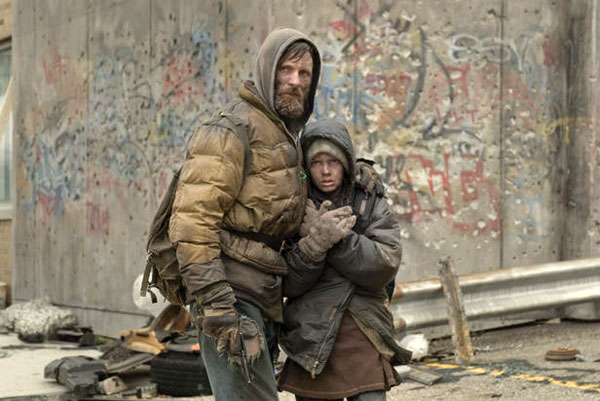The Road
Total Pageviews
Wednesday, April 11, 2012
Rhetoric Study
The most standout and clearly used rhetorical device in The Road was imagery. Throughout the entire novel McCarthy used imagery to convey the feeling of bleak despair in the main character's situation. The text uses words such as bleak, grey, dark and other shadowy, negative feeling words to emphasize the mood and the setting the majority of the book takes place in. McCarthy also uses more positive, godly words when describing or involving the two main characters. instead of 'black' words, he uses 'white' words, such as golden, light, and clean. the difference between these words and the way McCarthy describes the scenes that the characters experience both provide perfect mental visualizations of the author's ideas, they also continue to separate the main theme that the world is bad, and the Man and the Boy are good.
Cormac McCarthy
Cormac McCarthy, the author behind The Road, has also written many other well renowned and reviewed novels. The Road won both the Pulitzer Prize, and the James Tait Black Memorial Prize for Fiction. His arguably next most well known book No Country for Old Men was adapted into a movie and won four academy awards. Compared o William Faulkner by many modern critics, McCarthy's works have been published by the same man that published Faulkner's up until his death. Throughout McCarthy's lengthy career he has accumulated a multitude of grants and awards, including the Pulitzer Prize, and the Faulkner Prize, both highly prestigious awards to be given.
Image Study
 |
| The Man and The Boy |
Oprah interviews Cormac McCarthy
http://www.oprah.com/oprahbookclub/Cormac-McCarthy-on-Writing
Cormac McCarthy, the author of The Road, speaks with Oprah Winfrey about the impact, meaning, and success of his book. The two speak about what Cormac sees when he reads the book, and about what critics have read into the story and found. A very interesting interview to say the least.
Cormac McCarthy, the author of The Road, speaks with Oprah Winfrey about the impact, meaning, and success of his book. The two speak about what Cormac sees when he reads the book, and about what critics have read into the story and found. A very interesting interview to say the least.
Wednesday, March 7, 2012
The Conclusion
In the final chapters of The Road by Cormack McCarthy, the father and son arrive at their destination;the ocean. After arriving at the ocean the father succumbs to his progressing disease and passes away. The son makes attempts to help his father, but the father refuses to eat or drink any of his rations, knowing already that he is beyond help. The father's devotion to his son is present all the way up to his own death. After the father passes away, the boy is struck with grief, and an unsure feeling about the future. Luckily for the boy, another human stumbles upon their camp, a man only differentiated from others by the shotgun he carries. The boy is extremely wary of this man at first, but is eventually convinced that the man with the shotgun is a good guy also, and agrees to join the man with the shotgun and his family in their own quest of survival. the boy meets the mans family, including his wife and children. The ending of the story is significant, for it shows the father's efforts and sacrifices to provide a better life for his son are not futile, and that he succeeded in his "divine" purpose.
Tuesday, March 6, 2012
The Coast
From the early pages of the book all the way up to the end, the boy and his father have been trekking cross country to the coast, the ocean. The Ocean is their destination because for one, it gives them something in the future to look forward to, a goal, or a mission in life instead of wandering aimlessly. Having a purpose in life makes it much easier and a much more pleasant experience. Symbolically the Ocean is a symbol for hope, and the future. It is what keeps the boy and the man going on to the next day, it is something they can look forward to, and represents a positive change in their lives. The boy needs the hope a potentially better life in the future, and the coast is what he believes will allow him to have one.
Quote Analysis
"You wanted to know what the bad guys looked like. Now you know. It may happen again. My job is to take care of you. I was appointed to do that by God. I will kill anyone who touches you. Do you understand?
Yes.
He sat there cowled in the blanket. After a while he looked up. Are we still the good guys? he said.
Yes. We're still the good guys."
65
This quote from the man shows the two's, specifically the child's, ongoing struggle to confirm that they are in fact the good guys fighting against the evil. The boy is repeatedly unsure of their moral status and is forever unnerved by his father's adamant refusals to help others in the wasteland. The quote also shows the fathers belief that his divine purpose on earth is to protect and guide his son at all costs. This paternal devotion to his son is what drives his the man and gives him the strength of mind to do whatever needs to be done to ensure the safety and survival of his son.
Subscribe to:
Posts (Atom)